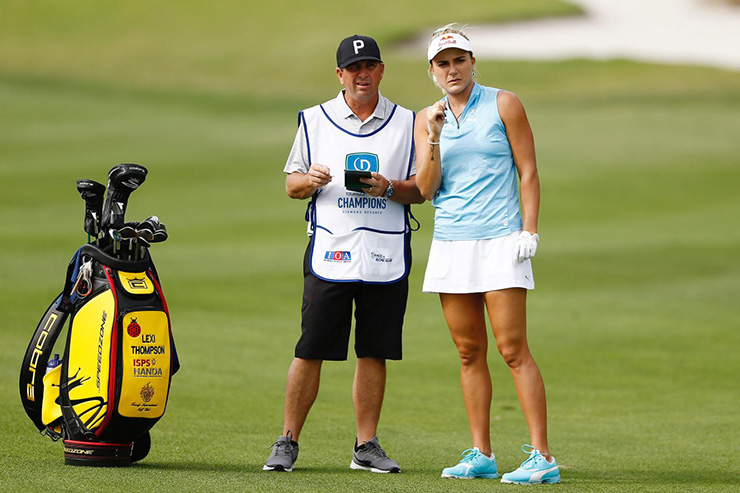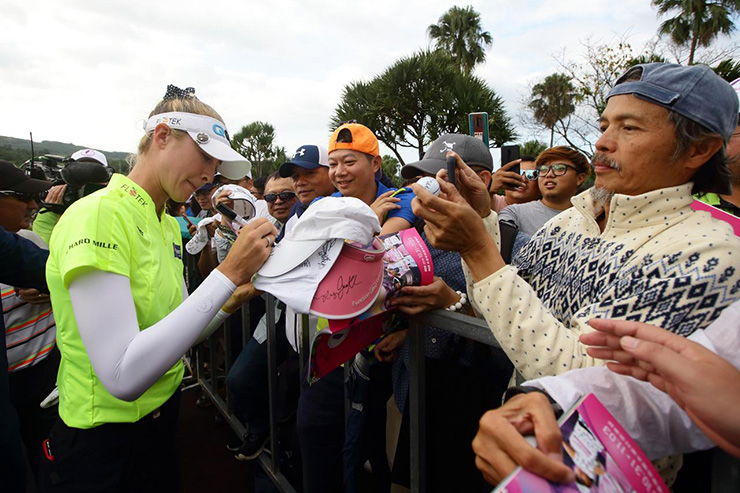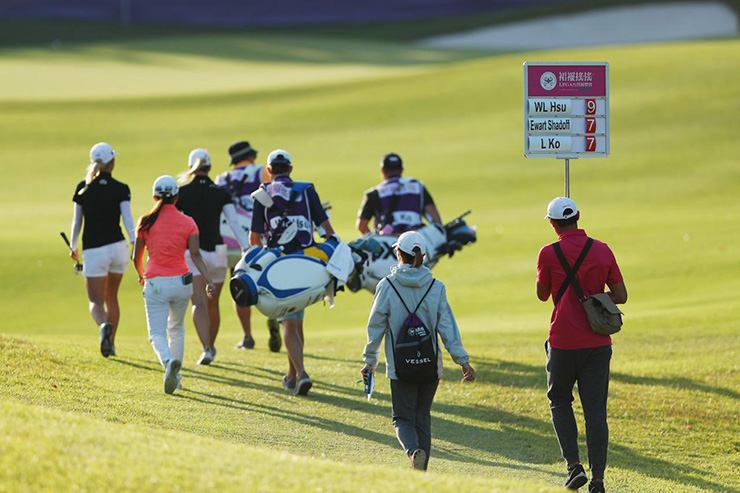Kevin Lee
By Keely Levins
The LPGA Tour’s long wait to restart is finally, almost, over. The LPGA Drive On Championship, set for July 31-Aug. 2 in Toledo, Ohio, will be the first LPGA event played since February. To get ready, Commissioner Mike Whan and his team took cues from what the PGA Tour has done in its five weeks back. On Wednesday, Whan said collaboration with the PGA Tour has been consistent and valuable to the LPGA’s restart.
“I just find it impressive that they [the PGA Tour] find our restart important, too. I think [commisioner] Jay [Monahan] feels the responsibility [that] he led golf back, and you know, us following and others following is important for golf,” Whan said.
As the LPGA begins playing golf in the COVID-19 era, some things are going to, predictably, look different. In laying out their protocols for events in 2020, the LPGA focused on making the playing environment as safe as possible, but Whan remains realistic, knowing that positive tests are going to come—as they have on the PGA Tour.
“It is strange to get started in a time in which we know we’re going to have positive results no matter what we build,” Whan said. “It won’t be anybody’s fault per say, but positive results happen, so spending as much time as we are on what happens when they are positive is a strange time as a commissioner. But we are trying to make sure that we’ve built all the resources that they would need, or we would need in going through these things.”
A look at the areas of greatest impact:
Several pro-ams will happen, with some changes
The PGA Tour has not staged pro-ams since its return, but they are the financial lifeblood of the LPGA. So, the tour is planning on having them, and the first will be at the Marathon Classic in Sylvania, Ohio, the second event of the LPGA restart.
On that Tuesday, there will be an off-site pro-am at Inverness—the site of the Drive On Championship being held a week prior—and then a pro-am on-site at Highland Meadows on Wednesday. Amateurs playing in pro-ams will be tested before coming on-site to play. The formats will also change: no more scrambles, with the goal being to keep three amateur players and an LPGA Tour player from congregating at one spot, for every shot. To reduce the number of people present, amateurs aren’t allowed to have caddies and ride in carts. The LPGA players will walk.
Whan said the tour is comfortable with opening up events to pro-am players because, “playing in a pro-am would be no different than the walking scorer walking with that group or any other staff member who might be near.
“I can tell you from talking to my players, almost all of them are playing golf and they are playing golf somewhere with people, and they feel like playing golf is something they can do safely. But it’s a lot more safe when you realize everyone has the same bracelet on that says, ‘I’ve been tested.’”
Caddies are optional
“Some players don’t really want to be close to anybody else during this period, and some players wouldn’t want to play tournament golf without their caddie, and we didn’t feel it was our place to make that decision one way or the other and leave that open to them,” Whan said.
Players who choose to not have a caddie can walk or use a pushcart, but can’t use electric carts.
Local caddies won’t be provided, “So you either have a caddie that you register [and] they are part of that testing protocol and testing pool, and if they are not, they are not part of the plan,” Whan said.

Lexi Thompson talks with her caddie. (Michael Reaves)
Major champion Pernilla Lindberg said that players are finding comfort in knowing they can play without a caddie if a situation arises in which their caddie tests positive and cannot travel or participate in the event.
“At least if that situation would happen the player knows that, OK, I’m not going to have to grab someone random last second,” Lindberg said. “I can always head out there and on my own.”
Testing
The LPGA will use a saliva test [the PGA Tour has been using a nasal swab test] for its players, caddies, staff, and “others within the testing pool.” Everyone will test at home the week before they travel to the event. Once at the event, they will be tested again. If a player gets tested on a Monday, the tour says that player would get a result back by 3 p.m. on Tuesday. But they won’t have to wait in their hotel room for that result.
“We will allow players to practice, play a practice round and use the practice facilities while waiting on those test results, but they will not be able to use any of the internal facilities—clubhouse, locker room, dining—until test results are returned negative,” said Heather Daly-Donofrio, the LPGA chief operations officer.
Players and everyone inside the LPGA bubble will have their temperature checked daily before entering the tournament site.
If someone does become symptomatic, he or she will meet with a physician on-site. To help get results quicker, testing labs have been set up locally at events.
Anyone who tests positive will have to withdraw and start isolating for a minimum of 10 days and has to return two negative tests before rejoining the tour. Players and caddies who test positive will receive $5,000 to cover the cost of their isolation stay, food, etc., as well as have support from the tour to make sure they have what they need during isolation, such as grocery deliveries.
No fans to start, but maybe soon

Nelly Korda signs autographs for fans at the 2019 Taiwan Swinging Skirts. (Suhaimi Abdullah)
The tour’s first event back will not have fans, but the second, the Marathon Classic, might.
“We’ll make a decision on fans, no fans on Marathon at the end of the week,” Whan said. “They are waiting for some local health input on that. We are good to go, and we have a plan whether we have fans—if we have fans, it will be 2,000 or less a day and we have a roping factor for that.”
Social distance guidelines
Everyone on-site is required to abide with social distancing standards by remaining six feet apart. So, you won’t see hugs, handshakes or fist bumps when players finish their rounds. Whenever anyone is inside, or outside and unable to socially distance (such as in the scoring area), facemasks will be worn.








